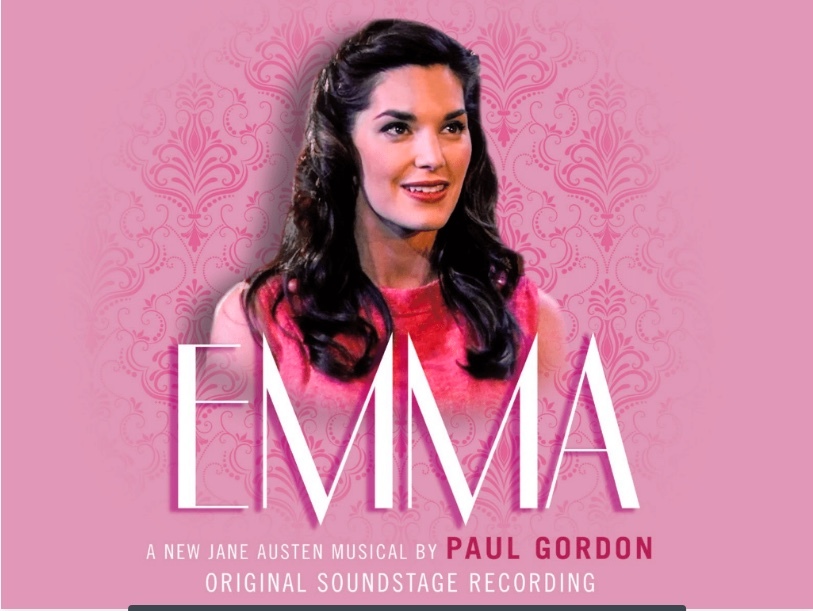BWW Album Review: Falling In Love Again With A Mid-Century EMMA

It is a truth universally acknowledged that there can never be enough Jane Austen adaptations - at least not for Austenites like me. Coincidentally, the theatre world is newly home to not one, but two works based on Austen's masterpiece Emma: Paul Gordon's musical adaptation, a regional staple for years, has finally received a cast recording within months of the debut of the musical version of Clueless, the '90s-teen-movie take on the comedy. Although the sometimes-mellow contemporary sound occasionally fails to capture the sharp edges of Austen's comedy, it's ultimately a pleasant and witty representation of the beloved comedy of manners.
The biggest challenge with adapting Emma as a musical is its heroine: Emma Woodhouse, as Austen herself describes her, is "handsome, clever, and rich, with a comfortable home and happy disposition, seemed to unite some of the best blessings of existence; and had lived nearly twenty-one years in the world with very little to distress or vex her." A musical, however, typically follows a character who wants something desperately and tries to get it - what to do with a protagonist who wants for nothing?
Gordon finds the core of Emma's character in a pair of early songs, "I Made The Match Myself" and "A Gentleman's Daughter," in which the intrepid heroine (played beautifully by Kelli Barrett) reveals an almost pathological need to meddle in others' lives and get credit for it. If you're thinking that sounds awfully unpleasant for a heroine, you'd be right: Emma, unlike most Austen heroines, is more of an antiheroine whose journey of learning to be a better person (and realizing that she longs for more than just meddling) forms the emotional core of the story.
The score moves briskly and wittily through the constantly-fluctuating romantic shenanigans that Emma, in her well-meaning but overbearing way, sets in motion. Subplots abound, starting with the misadventures that Emma leads her hapless "protegee" Harriet (Dani Marcus) into. Marcus does her best, but the score really does lean into poor Harriet's pathetic love life, with songs like "Humiliation" giving the character a bit too much self-pity. There's also the serious wires-crossed love triangle (or, more accurately, love pentagon at least!) involving the dashing Frank Churchill, sung by Will Reynolds with pitch-perfect charm. Frank is one of the more morally ambiguous characters in the Austen canon, and while the score doesn't quite get to his roguish but complicated motivations, Reynolds finds vocal moments (such as in "The Recital") to give glimpses at the character. Some of the narrative choices made by the adaptation - namely, moving up the revelations of Frank's secret and Knightley's true feelings - result in a different sort of tension than the novel: where the novel's resolution hinged on whether or not feelings were returned, the adaptation's ending hinges on when and how they'll admit it already.
It wouldn't be an Austen story without a dashing but flawed leading man. Here, that's Mr. Knightley, Emma's brother-in-law and verbal sparring partner, played by Timothy Gulan. From the first few songs through to the end, the pair's dynamic is evident, with lyrics that talk over each other and constantly trying to prove their points. Oddly - and perhaps this is simply a side effect of listening only to an album without the visual performance to back it up - Barrett and Gulan are top-notch alone, but don't quite strike sparks together. Gulan's "Emma" is a swooning, glorious love song, and Barrett does gorgeously on the emotional, aptly-titled "The Epiphany," but together, their dialogue and singing choices fail to fully capture the head-butting-turned-romantic-sparks.
Although Gordon's choice of a neutral, contemporary sound for the score occasionally results in mixed metaphors or awkward combinations (as in "Queen Anne's Lace," where the central image feels extraneous), for the most part, it's a clever way to convey Austen's language directly while creating a sound that's pleasant, often fun, and occasionally captures that sharp, trademark Austen wit. This is never more evident than in "Relations," a formal-sounding ensemble piece on the joys of families that includes lines such as "best to love them from afar." It's moments like these where this Emma shines: finding the perfect balance between contemporary comedy and the timeless joys of Jane Austen's words.
Add Your Comment
Videos
